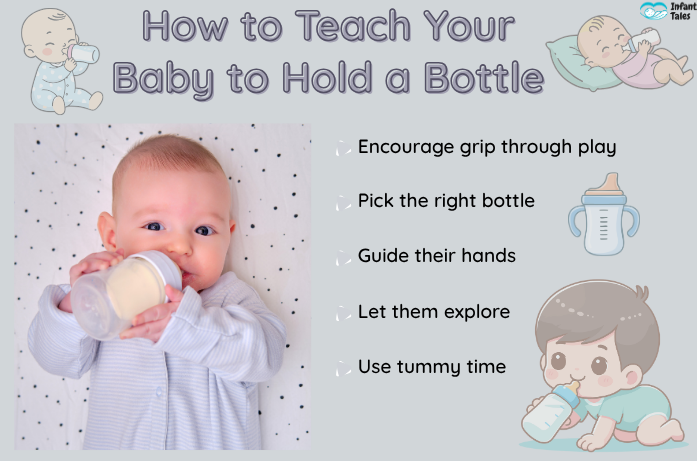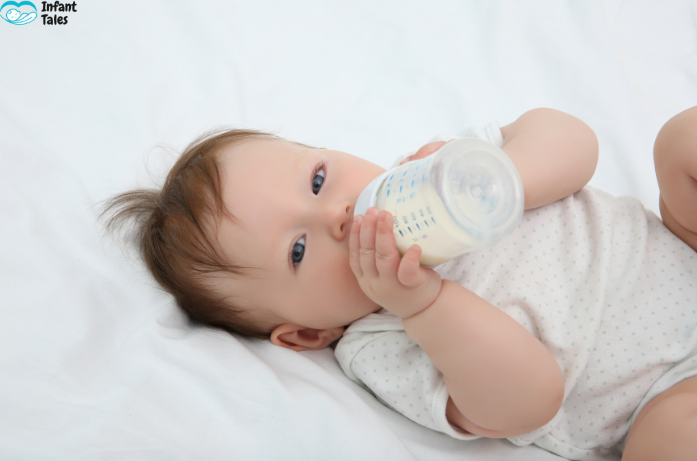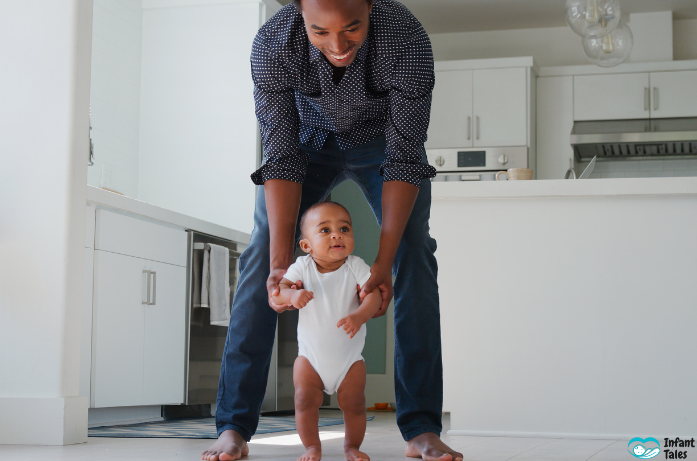By a Caring Mom at Infant Tales
One of the sweetest joys of parenting is watching your little one become more independent with every passing month, from the first giggle to that first wobbly attempt at sitting up. Among these beautiful baby development milestones by month, one that brings both delight and surprise is when your baby starts holding their own bottle.
Many parents ask: “When do babies hold their own bottle?” It’s a common question and a lovely reminder of how quickly babies grow and learn. This skill marks the beginning of greater coordination, confidence, and curiosity, a step toward doing things by themselves.
But just like crawling, walking, or talking, this milestone occurs on a different timeline for each baby. Familiarity with the process, indicators, and timing will empower parents to accompany their children’s development with patience and joy.
Understanding the Bottle-Holding Milestone
Before your baby can hold their bottle and eat on their own, their body and mind need to learn cooperation first. This phase is not only about having the power to lift something; it is about acquiring control, coordination, and awareness.
At the very beginning, the movements of the baby’s hands are mainly involuntary. However, as he/she grows, the development of the fine motor skills and muscle control starts becoming noticeable. Between 4 and 6 months, he/she starts to reach for objects, touch faces, and feel the different surfaces which are all necessary kinds of practice that help him/her get ready to hold a bottle.
In short, this is one of the key baby bottle feeding milestones. Your little one transitions from depending entirely on you to discovering the joy of self-feeding, a huge step toward independence.
Still, it’s important to remember that each baby develops differently. Just as one baby might roll over at five months while another waits until seven, the age for holding a bottle varies too. Every child’s pace is perfectly normal.
When Do Babies Hold Their Own Bottle?
Most babies start holding their bottle somewhere between 6 and 10 months old. Around this age, their grip becomes stronger, and they gain better control over their hands and arms. They may begin trying to grasp their bottle during feeding or even lift it toward their mouth.
The timing, however, depends on several factors:
- Muscle strength: Babies who spend time sitting or doing tummy time develop the upper body control needed to lift and balance a bottle.
- Curiosity: Some babies love trying new things early and will eagerly grab their bottle when they see it.
- Feeding experience: Babies who are bottle-fed more frequently often get more practice holding it.
If your little one still prefers you to hold the bottle at around 10 months, that’s completely fine. Babies follow their own rhythm when it comes to baby development milestones by month. However, what matters most is that you are observing a gradual development of their holding, playing, and exploring skills.
Signs Your Baby Is Ready to Hold Their Bottle
In fact, your little one will often give the clearest signal when they are ready for this new movement. Look for the following signs:
- They can sit with little or no support.
- They gesture towards the toys or the objects they have seen before.
- They display keen interest in the bottle and try to direct it to their mouths.
- They have already strengthened their grip, though it is not very long yet.
When these cues appear, your baby is likely ready to start experimenting. It’s the perfect time to gently encourage them and support their growing curiosity.

How to Teach Your Baby to Hold a Bottle
In case you are asking how to get the baby to hold the bottle, the trick is in making the entire process to be naturally occurring and enjoyable. There is no need for advanced things or strict practices, just some patience and support.
Here’s how you can help:
- Encourage grip through play: Give the child lightweight toys or rattles to develop his/her hand and finger muscles.
- Pick the right bottle: Go for smaller bottles which are easy to hold or that have handles on the side.
- Guide their hands: During the feeding time, softly put their hands on the bottle so they can get used to the movement.
- Let them explore: Let your baby take, hold and play with the bottle when not feeding them. Giving them chances builds their confidence.
- Use tummy time: The muscle build-up of the arms, shoulders, and core progresses the coordination.
Through these steps, your baby learns naturally without pressure. Remember, how to teach your baby to hold the bottle is less about instruction and more about creating opportunities to practice.
Why You Shouldn’t Rush This Milestone
It’s tempting to celebrate every moment of independence, but this is a stage that shouldn’t be rushed. Children learn best when they feel safe and supported, not pressured.
Here’s why patience matters:
- Safety: Choking is a risk to a baby if you force him or her to hold the bottle.
- Bonding: Feeding is a time of connecting, warming, eye contact, and comfort.
- Health: Avoid “bottle propping” (resting the bottle on a pillow). It can cause choking, ear infections, and even tooth decay.
Your baby will surely want to hold the bottle when he/she is ready. Until then, enjoy these cuddles as they are of equal importance for emotional growth as physical ones.
Common Myths About Bottle-Holding
Parents often receive different opinions about this stage. Let’s dispel some myths:
- Myth 1: By 6 months, babies must be able to hold the bottle.
Truth: A large number of infants are unable to master the necessary coordination till about 10 months. - Myth 2: If they hold the bottle, they are no longer in need of supervision.
Truth: Always supervise the baby to prevent choking or overfeeding. - Myth 3: Not holding the bottle indicates a developmental delay.
Truth: Quite a few babies are just a little slower, but it’s completely fine.
Knowing the truth helps parents focus on what matters most, enjoying each new step without pressure.
Tips from Parents Who’ve Been There
The primary message from real moms and dads is to stay calm and to allow the nature of things to take their course. Here are the recommendations that they shared:
- Choose bottles with slim shapes or handles.
- Let your baby explore and play with the bottle before feeding.
- Keep feeding moments relaxed and interactive.
- Praise effort, not perfection, every attempt is progress.
Remember, milestones are moments to enjoy, not deadlines to meet.
If Your Baby Isn’t Holding the Bottle Yet
If your baby hasn’t started holding their bottle by 10 to 12 months, try not to worry. Babies grow at their own pace, and it’s normal for some to reach milestones a little later than others. Focus on their overall development instead of one specific skill.
Notice if your baby tries to grab toys, sits up with some support, or shows curiosity during playtime. These are all signs of healthy progress. Some babies simply prefer the comfort of being fed by their parents a bit longer it’s part of both emotional and physical growth.
However, if your baby doesn’t try to grasp objects, appears floppy, or shows little interest in exploring by 9–10 months, it’s best to speak with your pediatrician. A few guided exercises or simple therapy sessions can strengthen coordination and help your little one meet future baby development milestones with confidence.
At What Age Do Babies Hold Bottle and Transition to Cups?
Once your little one starts holding their bottle with confidence, the next step will be packed towards cup usage, probably between 12 and 18 months.
This transition also improves oral health and self-feeding habits. To make it easier:
- Offer a small sippy cup with handles.
- Introduce water or a bit of milk at first so that spills are not too messy.
- Practice during meal times but do not hurry.
These gradual steps will lead your baby from bottle feeding to drinking independently, which is another fun part of the baby bottle feeding milestones.
Conclusion: Every Baby Reaches Milestones in Their Own Time
So, at what point do babies begin to manage their own bottles? The majority of infants tackle this practice during the period of 6 to 10 months; however, within this span there is a big variation in normal. Some may manage it earlier while others may need a bit more time, and that is totally okay.
Grasping a bottle is not only a feeding skill but also a sign of growing independence, power, and maturity. It is a reflection of the baby’s journey from the very small hands that could not grip at all to the strong and assertive fingers that are curious and willing to explore.
As parents, your role is to support, encourage, and celebrate each small victory. Because at Infant Tales, we believe that every milestone, no matter how small, is a beautiful story worth telling.
Frequently Asked Questions (FAQs)
1. When do babies start holding their own bottle?
Most babies do this between 6 and 10 months, though it varies from child to child.
2. How can I help my baby learn to hold their bottle?
Encourage play that strengthens grip, use easy-to-hold bottles, and gently guide their hands during feeding.
3. Is it okay if my baby doesn’t hold their bottle yet?
Yes, every baby grows differently. As long as they’re reaching for toys and showing curiosity, it’s perfectly fine.
4. Should I let my baby feed alone once they can hold the bottle?
Always supervise feeding. Even if your baby is skilled, accidents can happen quickly.
5. At what age should babies switch from a bottle to a cup?
Most experts recommend transitioning between 12–18 months.
Parenthood is filled with countless precious firsts, from that first smile to that first sip.
Join the Infant Tales community today for trusted baby care guides, expert insights, and warm parenting stories written with love.
Subscribe to Infant Tales and make every milestone a memory worth cherishing.
Disclaimer: This article is for informational purposes only and should not replace medical advice. Always consult your pediatrician about your baby’s feeding and developmental milestones.



